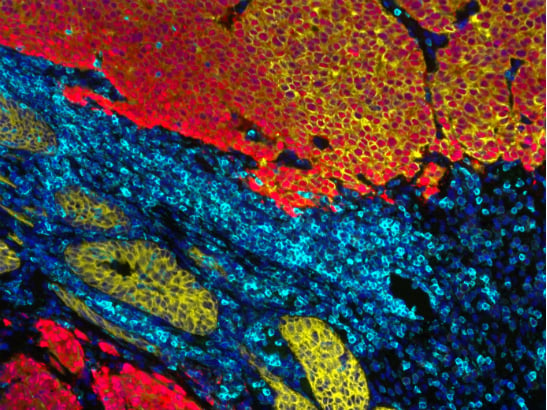
A new type of treatment strategy targeting a protein found on the surface of the most lethal prostate cancers could hold promise against the disease.
Researchers showed that targeting the protein B7-H3 (also known as CD276), which may help regulate the immune response, could be an effective treatment strategy for some prostate cancers – paving the way for a new state-of-the-art therapy.
The team of scientists at The Institute of Cancer Research, London, also found that the most aggressive prostate cancers had high levels of B7-H3 on their surface, compared with normal cells in the body, which makes them vulnerable to targeting this protein.
Using anti-B7-H3 drugs
Anti-B7-H3 drugs, known as ‘immunoconjugates’, are highly specific and effective - targeting B7-H3 and homing onto cancer cells to minimise toxicity to other cells.
These drugs consist of antibodies – capable of recognising cancer by binding to B7-H3– joined to a second molecule, such as a toxin, that can kill the cell. These drugs work like ‘armed antibodies’, delivering a toxin to cancer cells directly.
In this study, published in European Urology, scientists examined biopsy samples from 98 men treated for prostate cancer between 2011 and 2019. They also used mice and organoids in the lab to test the effectiveness of anti-B7-H3 drugs.
B7-H3 linked to aggressive cancers and faulty DNA repair
First, they looked at prostate cancer samples from patients before and after developing resistance to hormone therapy – a common treatment for the disease, which starves the cancer of the testosterone hormone it needs to grow. The ICR scientists found that approximately 9 out of 10 patients (91 out of 98) had prostate cancers expressed B7-H3 on their cancers once they had developed resistance to hormone therapy.
When they looked at the available samples taken at diagnosis for 72 out of 98 men – before men developed resistance to hormone therapy – they found B7-H3 was also expressed in most men (70 out of 72). This shows that B7-H3 is found on most aggressive prostate cancer cells from diagnosis, suggesting that this drug could be used as soon as the disease is detected.
Researchers also found that prostate cancers presenting the B7-H3 protein on the surface of their cells often had more faults in DNA repair genes like ATM and BRCA2, pointing to a link between expression of B7-H3 and faulty DNA repair.
Clinical trials underway
Next, the ICR researchers evaluated the ability of DS-7300a – an anti-B7-H3 drug known as an antibody drug conjugate (ADC) – to attack and destroy prostate cancer cells in tumours with different levels of B7-H3 expression and different genetic faults, including faults in DNA repair genes.
They found that targeting B7-H3 with this drug in prostate cancer cell lines, 3D organoids made from prostate cancer patient samples, and mice bearing patient-derived prostate cancers, showed impressive anti-tumour activity in the lab – shrinking tumours and causing prostate cancer cells to die.
Even though B7-H3 needs to be expressed for DS-7300a to work, scientists found that the level of expression may not be key to drug sensitivity. This means researchers will need to look at other factors, such as specific tumour gene faults, when selecting patients likely to benefit from anti-B7-H3 drugs.
The study was funded by the US Department of Defense, with additional support from Cancer Research UK, Prostate Cancer UK and the Prostate Cancer Foundation.
Next, researchers are planning clinical trials to evaluate anti-B7-H3 targeting drugs in prostate cancer patients.
They will also investigate the mechanisms driving differences in B7-H3 expression in tumours with different genetic faults to better understand the role of B7-H3 in cancer growth and to help them develop better B7-H3 targeted therapies.
A new treatment strategy
Study leader Professor Johann de Bono, Regius Professor of Cancer Research and Professor of Experimental Cancer Medicine at The Institute of Cancer Research, London, and Consultant Medical Oncologist at The Royal Marsden NHS Foundation Trust, said:
“When the protein B7-H3 is present on prostate cancer cells, the disease tends to progress and spread rapidly. Targeting B7-H3 is likely to become a key treatment strategy against prostate cancer, as we have shown that using drugs against this protein can destroy cancer cells and shrink tumours.
“Anti-B7-H3 drugs are a type of drug known as ‘immunoconjugates’. Other immunoconjugates have led to major clinical success in many solid cancer types, but not to date in prostate cancer.”
We need your help in training the next generation of PhD scientists who will become tomorrow's research leaders. Help us find tomorrow’s cancer treatments, so more patients will survive cancer.
'The potential to benefit a significant proportion of patients'
Study author Dr Christina Guo, Clinical Research Fellow and PhD student in the Prostate Cancer Targeted Therapy Group at The Institute of Cancer Research, London, said:
“Our findings also reveal that B7-H3 is expressed by the vast majority of aggressive prostate cancers from the time of diagnosis, and in particular in men whose prostate tumours have faults in DNA repair genes. This means that drugs targeting B7-H3 have the potential to benefit a significant proportion of these patients.
“These anti-B7-H3 drugs, or immunoconjugates, consist of antibodies – which bind to specific targets on cancer cells, in this case B7-H3 – joined to a second molecule capable of killing cancer cells. In this way, these armed antibodies can be launched, like a guided missile, against cancer.”
